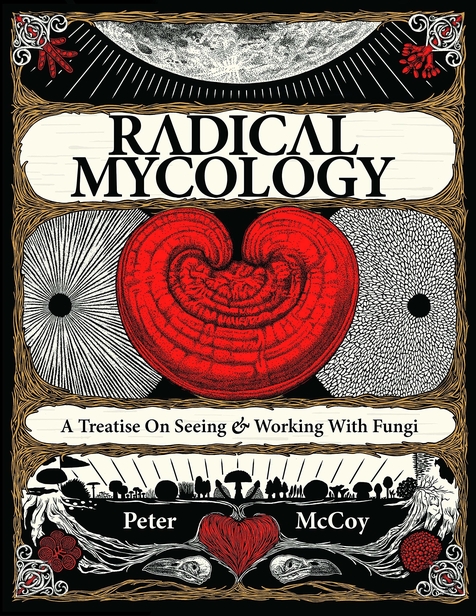
Radical Mycology is not just the title of this brilliant compendium on everything fungal, but also the name of the collaborative network co-founded by fungi expert and author Peter McCoy, who here examines the ecological concept of Permaculture, which is gaining traction as more people become aware of the healing properties of the humble mushroom in a quest to save the planet.
Mycology, the study of fungi, is an ancient discipline that can be traced to the beginning of human existence, and as Peter McCoy, a mycologist from Portland with many years experience of both the scientific and culinary possibilities of fungi explains, it is impossible to study fungi (and lichens, their weirdly amazing cousins) without realizing that everything on the planet is connected and symbiotic. Without fungi, the planet would not be able to break down dead matter, toxins, and garbage, nor would it feed animals, insects, plants, trees, and soil so brilliantly, and without a thought from us mere humans.
While there are many “mushroom” books hitting this trend, such as fungal biologist Merlin Sheldrake’s offering this summer, many books go into little detail of the actual practical knowledge of fungi, instead waxing lyrical about the potential of fungi in the modern world, talking about what might be achieved in a somewhat quixotic manner. McCoy approaches the subject in such a comprehensive way: we get the bones, the basics, the setups, the assemblies for cultivating and using fungi in many different ways, and how we might apply those in the world, helping fungi to network and create pathways in nature to thrive. But we also get the science, the chemistry, the biology, and the socioecological impact that fungus has had historically, and could have moving forward.
Peter McCoy’s work is something of a bildungsroman for molds and lichens everywhere. At nearly 700 pages, it is a true encyclopedia of every angle, explained beautifully and carefully with diagrams and photos to illustrate his subject. Simply put, McCoy’s tome is essential, and mushroom fanatics will enjoy this book as a progression from the likes of Paul Stamets’ work of the last decades. What is most interesting here are the answers McCoy gives to a Permaculture perspective: We can permanently fix our environments to produce enough food, cultivating rich and sustainable soils.
The information on improving our immediate environment is fascinating: what are the spores available in our immediate environment, and how can we cultivate these to help with the local surrounds of where we live? If you have even a slight interest in gardening and horticulture, this book will improve your understanding of microcosms in your backyard in a massive way, supported with marginalia from a smorgasbord of scientists, thinkers, and contemporaries. What is also so special are the worksheets, games, and setups for getting into collaborative mycology.
If there’s any criticism, it lies in the index, which is not as full as it could have been, and is lacking in places with some of the big obvious hitters you might expect to see there, which means it’s necessary to think around corners to find how the subject is listed. In a book so huge, it must have been a monster task to set it up, but it really could do with another going over to make it really useful, maybe even worth getting a really niche editor to create the index. Ideally, the book would also have a hardcover edition, as it’s just too heavy a book for a paperback incarnation and doesn’t hold up to relaxed reading without threatening to rip from its glue and fall apart.
Fundamentally, McCoy makes other modern mycologists seem a step behind, as the years of learning McCoy has invested in fungi has uncovered much more interesting and engaging facts than the psychedelic use of mushrooms, or how to go about woodland foraging, but he does discuss these angles as much as needed, and those looking for information will find it comprehensively discussed here along with uses for all edible mushrooms as well as covering poisonous fungi and how to identify them. The book is simply amazing in its breadth and wisdom.
The passion and joy that McCoy gets from studying these amazing living forms is evident, and also infectious, on every page, and it is rare to find such glorious presentation in an independently published book from the content to the editing to the illustrations and cover design, complete with a wonderful mushroom cap sticker. Just everything about this book makes you want to read it and share in McCoy’s wonder and discovery of this subject. It will be impossible to come away from this read with anything but admiration for the author, and at least a “spore” of interest in fungi as a tool in our battle to save the environment. Get this book, and you’ll never need another book on mycology in your lifetime.
Book Links
STAR RATING
Design
Content
Editing
Get an Editorial Review | Get Amazon Sales & Reviews | Get Edited | Get Beta Readers | Enter the SPR Book Awards | Other Marketing Services























Leave A Comment